BMW i4 VS Ford Transit Connect
BMW i4
The BMW i4 beautifully merges the dynamism of a saloon with the efficiency of an electric vehicle, offering a truly exhilarating driving experience. Its design seamlessly blends elegance and athleticism, highlighting BMW's dedication to both aesthetics and performance. Inside, the i4 boasts a high-tech cockpit that harmonises luxury with intuitive technology, allowing drivers to stay connected while on the move.
more informationFord Transit Connect
The Ford Transit Connect is a versatile compact van that seamlessly combines functionality with a comfortable driving experience. Its spacious interior is designed to accommodate both passengers and cargo, making it an ideal choice for small businesses and active families alike. With its efficient engine and agile handling, the Transit Connect offers a reliable and economical option for urban and suburban driving.
more information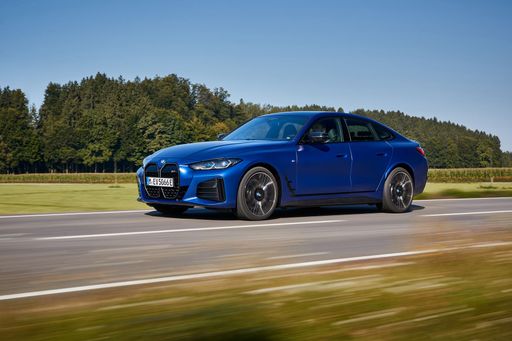 @ press.bmwgroup.com
@ press.bmwgroup.com
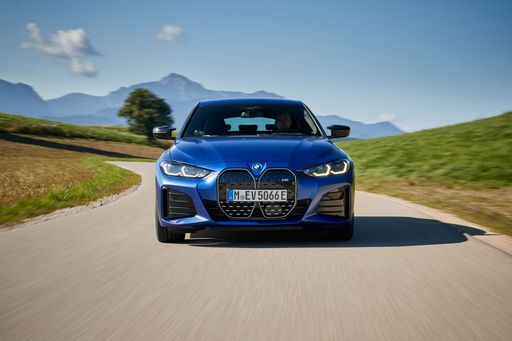 @ press.bmwgroup.com
@ press.bmwgroup.com
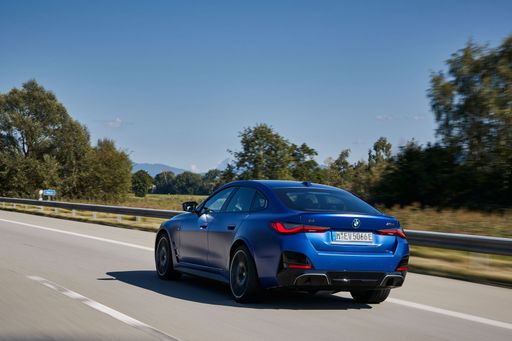 @ press.bmwgroup.com
@ press.bmwgroup.com
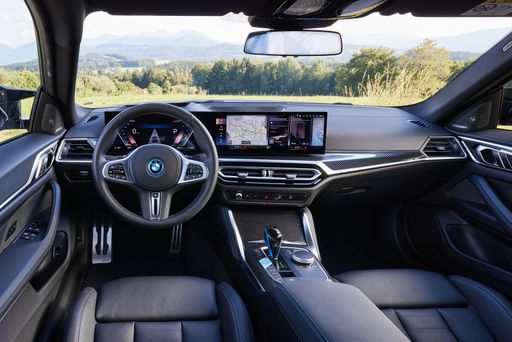 @ press.bmwgroup.com
@ press.bmwgroup.com
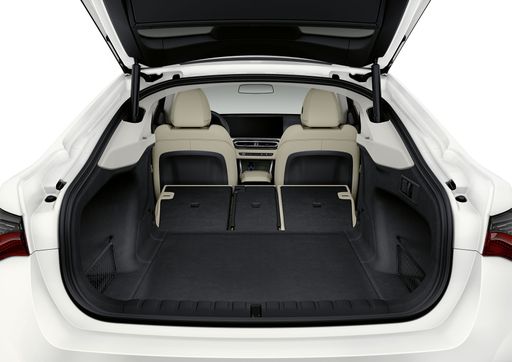 @ press.bmwgroup.com
@ press.bmwgroup.com
Costs and Consumption |
|
|---|---|
|
Price
about 53200 - 66600
$
|
Price
about 28300 - 44700
$
|
|
Consumption L/100km
-
|
Consumption L/100km
-
|
|
Consumption kWh/100km
15.6 - 18
kWh
|
Consumption kWh/100km
-
|
|
Electric Range
485 - 582
km
|
Electric Range
-
|
|
Battery Capacity
67.1 - 81.3
kWh
|
Battery Capacity
19.7
kWh
|
|
co2
0
g/km
|
co2
-
|
|
Fuel tank capacity
-
|
Fuel tank capacity
50
L
|
Dimensions and Body |
|
|
Body Type
Hatchback
|
Body Type
Cargo Van
|
|
Seats
5
|
Seats
2 - 5
|
|
Doors
5
|
Doors
4
|
|
Curb weight
2075 - 2290
kg
|
Curb weight
-
|
|
Trunk capacity
470
L
|
Trunk capacity
-
|
|
Length
4783
mm
|
Length
4500 - 4868
mm
|
|
Width
1852
mm
|
Width
1855
mm
|
|
Height
1448
mm
|
Height
1856 - 1860
mm
|
|
Payload
445 - 480
kg
|
Payload
-
|
Engine and Performance |
|
|
Engine Type
Electric
|
Engine Type
Diesel, Plugin Hybrid
|
|
Transmission
Automatic
|
Transmission
Manuel, Automatic
|
|
Transmission Detail
Reduction Gearbox
|
Transmission Detail
Manual Gearbox, Automat. Schaltgetriebe (Doppelkupplung)
|
|
Drive Type
Rear-Wheel Drive, All-Wheel Drive
|
Drive Type
Front-Wheel Drive
|
|
Power HP
286 - 544
HP
|
Power HP
102 - 150
HP
|
|
Acceleration 0-100km/h
3.9 - 6
s
|
Acceleration 0-100km/h
11.4 - 13.5
s
|
|
Max Speed
190 - 225
km/h
|
Max Speed
175 - 186
km/h
|
|
Torque
400 - 795
Nm
|
Torque
280 - 350
Nm
|
|
Number of Cylinders
-
|
Number of Cylinders
4
|
|
Power kW
210 - 400
kW
|
Power kW
75 - 110
kW
|
|
Engine capacity
-
|
Engine capacity
1498 - 1968
cm3
|
|
Top speed
190 - 225
km/h
|
Top speed
175 - 186
km/h
|
General |
|
|
Model Year
2024
|
Model Year
2024
|
|
CO2 Efficiency Class
A
|
CO2 Efficiency Class
-
|
|
Brand
BMW
|
Brand
Ford
|
BMW i4
Exploring the Future: The BMW i4
In the ever-evolving landscape of electric vehicles, BMW has stepped forward with its state-of-the-art BMW i4. This model combines luxury, performance, and sustainability, reflecting the brand's commitment to innovation and excellence. Let's dive into the technical details and the innovative features that make the BMW i4 a noteworthy entry in the electric vehicle market.
Power and Performance Unleashed
Under the sleek bonnet of the BMW i4 lies a powerful electric motor, offering a range of performance options from 286 to an exhilarating 544 PS. With a 0 to 100 km/h acceleration time spanning between 3.9 and 6 seconds, the i4 provides a driving experience that matches its sporty exterior. The advanced powertrains offered include rear-wheel drive as well as all-wheel drive options, catering to different driving preferences.
Energy Efficiency Meets Long Range
The BMW i4 stands out not only for its performance but also for its impressive efficiency and range. The electric vehicle boasts a consumption rate ranging from 15.6 to 18 kWh per 100 km, complemented by an electrical range between 485 and 582 km. Such figures are achieved through BMW's innovative engineering and the generous 67.1 to 81.3 kWh battery capacity.
Innovation and Technology at the Core
BMW has infused advanced technology throughout the i4 to enhance both comfort and connectivity. The vehicle features state-of-the-art integration with the BMW iDrive system, providing seamless control and access to driving data, entertainment, and navigation. Furthermore, the i4 is fitted with cutting-edge driver assistance features, making every journey safer and more enjoyable.
Design and Functionality: The Perfect Balance
The aesthetically pleasing design of the BMW i4 is equally matched by its functional interior. With a 470-litre boot and the ability to comfortably seat up to five passengers, the vehicle balances practicality with style. The streamlined body measuring 4783 mm in length, 1852 mm in width, and 1448 mm in height, ensures that head-turning aesthetics are accompanied by aerodynamic efficiency.
Sustainability in Motion
Beyond performance and elegance, the BMW i4 is a testament to the brand's commitment to sustainability. As a zero-emission vehicle with a CO2 output of 0 g/km, it aligns with the global shift towards environmentally friendly transportation solutions. Furthermore, its efficient energy consumption underscores its effectiveness as a leader in electric vehicle innovation.
Conclusion: The BMW i4 – A Visionary Road Ahead
The BMW i4 is more than just an electric car; it is a sophisticated blend of cutting-edge technology, impressive range, and unparalleled performance. With its CO2 efficiency class rating of A and top-tier driving dynamics, the i4 is set to redefine the standards for electric vehicles in the luxury segment. Whether for a daily commute or a longer journey, the BMW i4 promises an exceptional driving experience while paving the way for a sustainable future.
Ford Transit Connect
The Versatile Ford Transit Connect: An In-Depth Overview
The Ford Transit Connect has long been a staple in the light commercial vehicle market. Renowned for its versatility, efficiency, and robust build, this model offers a variety of configurations to suit different business needs. In this article, we delve into the technical specifications and innovative features of the latest iteration of this ever-popular vehicle.
Powerful Engine Options and Performance
Under the bonnet, the Ford Transit Connect offers a range of powerful and efficient engines. The standard diesel options include the robust 2.0 EcoBlue Diesel engines, available with either manual or automatic transmissions. For those seeking a greener option, the Transit Connect also offers a 1.5 EcoBoost PHEV Plug-In Hybrid with a 150 PS output. This array of options ensures that drivers can choose a powertrain that best suits their performance requirements and environmental considerations.
Advanced Design and Dimensions
In terms of design, the Transit Connect is engineered for practicality without sacrificing aesthetics. Measuring between 4500 mm and 4868 mm in length, and 1855 mm in width, it is well-suited for urban environments while offering ample cargo space. The vehicle’s height spans from 1856 mm to 1860 mm, providing a spacious interior that is both comfortable and functional for drivers and passengers alike.
State-of-the-Art Features and Specifications
Technology and convenience feature prominently in the Transit Connect’s offerings. The latest model includes refined details and equipment lines like Limited, Trend, and the more feature-rich Active Automatik. Its advanced infotainment system, safety features, and driver assistance technologies work harmoniously to enhance both driving experience and passenger safety.
Additionally, the vehicle boasts a battery capacity of 19.7 kWh in the hybrid variant, enabling impressive electric-only ranges for day-to-day journeys. The inclusion of dual-clutch automatic transmission in certain models significantly enhances driving dynamism and reduces fuel consumption.
Fuel Economy and Driving Range
The Transit Connect impresses with its fuel economy, particularly in its hybrid iteration. With a fuel tank size of 50 litres and the efficiency of hybrid technology, the vehicle assures drivers of fewer stops at filling stations and more time spent on the road. Despite its commercial nature, it manages to achieve competitive emission figures, an important factor for eco-conscious businesses.
Versatility in Configuration
One of the standout features of the Ford Transit Connect is its adaptability. Available in different configurations, this model can accommodate between two and five passengers, making it suitable for both cargo transport and passenger services. Its flexibility extends to the range of available options for customisation, ensuring it can be configured for various business and personal needs.
Conclusion
The Ford Transit Connect continues to lead the market with its blend of robust performance, innovative features, and adaptability. Whether used for urban delivery, passenger transport, or any number of other commercial applications, the Transit Connect fulfills its role effectively, embodying Ford’s commitment to quality and performance.
With its combination of traditional internal combustion and hybrid powertrains, the Transit Connect addresses both modern environmental concerns and longstanding demand for reliable utility workhorses, making it a noteworthy option for businesses and families alike.
